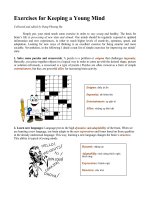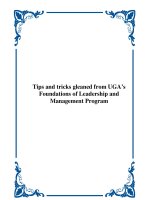Tài liệu Tips on Studying a Foreign Language - Những lời khuyên để học một ngoại ngữ docx
Bạn đang xem bản rút gọn của tài liệu. Xem và tải ngay bản đầy đủ của tài liệu tại đây (70.87 KB, 3 trang )
Tips on Studying a Foreign Language
Những lời khuyên để học một ngoại ngữ
Learning another language is not easy, but most people can learn a second language IF they are
willing to put in the necessary time. Here are some practical suggestions for studying effectively,
overcoming anxiety, and learning the grammar and skills necessary for success in foreign language
classes.
Học một ngôn ngữ không phải là ngôn ngữ mẹ đẻ là không dễ, nhưng bạn có thể học nếu bạn sẵn
sàng dành thời gian học nó. Đây là một số lời khuyên để học hiệu quả, khắc phục sự lo lắng và lời
khuyên để học ngữ pháp cũng như những kỹ năng cần thiết cho sự thành công trong việc học một
ngoại ngữ.
1. STUDY EVERY DAY! A foreign language course is different from any other course you take.
Language learning is cumulative: you cannot put it off until the weekend. Study 1 or 2 hours for
every class hour if you want an A or B.
HỌC MỖI NGÀY
2. DISTRIBUTE YOUR STUDY TIME in 15- to 30-minute periods throughout the day. Focus on a
different task each time: vocabulary now, grammar next, etc. Get an overview during the first half
hour: spend 10 minutes reviewing dialog, 10 minutes learning new vocabulary, 10 minutes
learning new grammar...so you'll at least have looked at it all. Approximately 80% of your study
time should be spent in recitation or practice, including practice in the language lab.
SẮP XẾP THỜI GIAN HỌC TẬP
3. ATTEND AND PARTICIPATE IN EVERY CLASS--even if you are not well prepared. Class time
is your best opportunity to practice. Learn the grammar and vocabulary outside of class in order
to make the most of class time. Spend a few minutes "warming up" before each class by
speaking or reading the language.
THAM DỰ VÀ THAM GIA HOẠT ĐỘNG TRONG LỚP HỌC
4. MAKE YOURSELF COMFORTABLE IN THE CLASSROOM. Get to know your classmates, so
you will feel you are among friends. Visit your instructor during office hours to get acquainted:
explain your goals and fears about the course to your instructor.
HÃY TỰ TIN (THOẢI MÁI) TRONG LỚP HỌC
5. LEARN GRAMMAR IF YOU DON'T ALREADY KNOW IT. Grammar is the skeleton of a
language, its basic structure: you must learn it. Review a simplified English grammar text.
Compare new grammatical structures in your foreign language to their English equivalents.
HỌC NGỮ PHÁP NẾU BẠN KHÔNG BIẾT NÓ
6. PRACTICE FOR TESTS by doing what you will have to do on the test. If the test will require you
to write, then study by writing--including spelling and accents. If you will be asked to listen, then
practice listening. Ask for practice questions; make up your own test questions. Invent variations
on patterns and forms. Over-learn: study beyond the point of recognition to mastery.
LUYỆN TẬP NHỮNG BÀI KIỂM TRA
7. DEVELOP A GOOD ATTITUDE. Have a clear personal reason for taking the class. Set personal
goals for what you want to learn. Leave perfectionism at the door; give yourself permission to
make mistakes and learn from them.
XÁC ĐỊNH MỤC TIÊU HỌC TẬP
8. GET HELP IF YOU NEED IT. Talk with your teacher. Form study groups among class members.
Use tutoring services. Don't wait!
NHỞ AI ĐÓ GIÚP ĐỠ NẾU THẤY CẦN
READING and WRITING a foreign language are analytical skills. You may be good at these if you are a
logical person who attends to detail. Train yourself through practice to notice and remember details such
as accents and gender agreement.
READING SKILLS TIPS:
1. First, read the vocabulary list for the assignment. Next, read the questions about the reading.
Then read all the way through a new passage two or three times, guessing at meaning from
context. Avoid word-by-word translation. It is a waste of time!
2. Isolate new vocabulary and study it separately. DON'T write between the lines! Make flash
cards. Carry them with you and recite them several times during the day at odd moments.
Overlearn them until they are automatic.
3. Isolate new grammatical forms and study them separately. Write the pattern on a flash card and
memorize it. Write out and label a model sentence. When you encounter the form while reading,
pause and recite the pattern to recognize the form.
WRITING SKILLS TIPS:
1. Pay attention to detail: notice accents, order of letters, etc. Compare letter-by-letter different
forms (singular, plural, gender, etc.). Write out conjugations of verbs, declensions of pro-nouns,
etc., and check your endings. Memorize irregular verbs.
2. To master spelling, have a friend dictate 10 words to you. Write them out and immediately have
your friend spell them correctly aloud while you look carefully and point at each letter. Repeat
until you get all the words right.
3. Write (in your own simple foreign vocabulary words) a story you have just read.
LISTENING and SPEAKING are performance skills. You may do well at these if you are naturally
outgoing. Students in foreign language classes often have difficulty hearing and speaking because they
are anxious about making mistakes. It's OK to make mistakes! Have fun trying to speak!
LISTENING SKILLS TIPS:
1. Frequent the language lab. Read the exercises in your book first; then listen and read together;
then listen without looking at the print. Say aloud/write what you hear.
2. Participate silently in class when others are called on to speak. Focus on the task; don't worry
about how you'll do.
3. If you feel nervous, relax yourself physically by taking a couple of slow, deep breaths. When
called on, pause, relax, and give yourself time to respond.
4. Listen while a friend dictates to you and write what you hear. Check for accuracy.
5. Practice: join language clubs, watch foreign TV, listen to foreign radio.
SPEAKING SKILLS TIPS:
1. Study out loud! Mimic the sounds of the language. Don't mumble. Although most people feel
embarrassed making strange sounds, the language will soon feel more familiar to you.
2. When called on in class, say something, even it it's wrong: you'll learn from it. If you need a
moment to think, repeat the question. If you don't know the answer, say in your foreign
language, "I don't know" or "help!"
3. Practice with a foreign student who wants your help to learn English or with another class
member.









